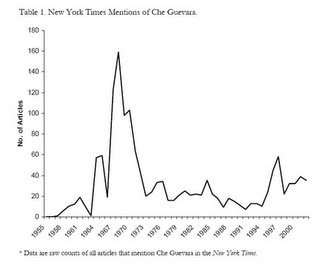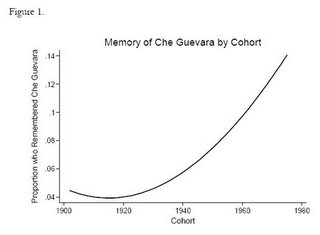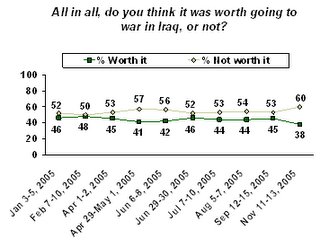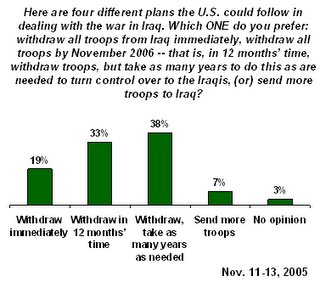Thursday, November 10, 2005 by Jeff
In a previous post I raised the questions what does the image of Che Guevara mean and has the commodification of this icon depoliticized him? Ten months later I have some data, and now Omar and I are working out our ideas in a paper about collective memory.
The data come from a national survey of adults in Spain in 1991 and 1993. Among the battery of questions, is one that asks respondents to name two famous Latin American figures. The most common responses include revolutionary Simon Bolivar, author Gabriel Garcia Marquez, and far and away the most frequently mentioned figure, Che's old boss, Fidel Castro. Che also easily broke the top ten. The question that interests us, and one that we think can provide insights into the two questions driving this research, is who remembers Che?
Karl Mannheim long ago hypothesized that generations of people are defined by their shared experience - and memory - of major political and social events (and, by extension, people) that occurred as they came of age (ages 18-25 in his mind). When applied to the Che question, we should expect that those most likely to recall Che came of age in the Sixties when he held national posts in the Cuban government and was killed in Bolivia. That period also marks his most visible years in the international press. The figure below shows the number of mentions of his name in the New York Times since 1955. The peak (1968) coincides with the year following his widely publicized death.
 In our data, however, the pattern looks much different. The figure below shows respondents' years of birth and the likelihood that they mention Che Guevara. We do find a strong generational effect - i.e., age does matter - but not in the way Mannheim expected. Turns out that the baby boomers of the Sixties are significantly less likely to recall Che than their children. So this is the puzzle for our research: why are younger generations more likely to remember Che than their parents and grandparents?
In our data, however, the pattern looks much different. The figure below shows respondents' years of birth and the likelihood that they mention Che Guevara. We do find a strong generational effect - i.e., age does matter - but not in the way Mannheim expected. Turns out that the baby boomers of the Sixties are significantly less likely to recall Che than their children. So this is the puzzle for our research: why are younger generations more likely to remember Che than their parents and grandparents?
 It might be that the commodification of Che has indeed depoliticized him. The young remember him because his image has reached a much wider audience who know little about his politics but avidly buy his t-shirts, posters, and key chains. Or, maybe the t-shirt industry isn't so powerful as to erase Che's politics from memory and social movements have successfully sustained him as a political symbol. If the latter is true, we ought to find evidence that those who remember Che are somehow more political or otherwise affected by social movements than those who don't. If not, perhaps he has become an empty t-shirt with all the political potency of Fruit of the Loom.
So...what's your prediction?
It might be that the commodification of Che has indeed depoliticized him. The young remember him because his image has reached a much wider audience who know little about his politics but avidly buy his t-shirts, posters, and key chains. Or, maybe the t-shirt industry isn't so powerful as to erase Che's politics from memory and social movements have successfully sustained him as a political symbol. If the latter is true, we ought to find evidence that those who remember Che are somehow more political or otherwise affected by social movements than those who don't. If not, perhaps he has become an empty t-shirt with all the political potency of Fruit of the Loom.
So...what's your prediction?

 | »
| »
Friday, November 04, 2005 by Jeff
Last week I got my first resounding rejection from a major journal. Two of the three discouraging reviews emitted vile, vituperative venom the likes of this:
"...borders on the rediculous."
"...an absolutely ridiculous and misleading claim...The notion...is laughable."
"...since I am unpersuaded...the analysis of the data is moot."
"...go back to the drawing board."
For those who would judge me, bear in mind that my co-author (and author of most of the claims criticized above) is a widely published professor at a large Southwestern university. Needless to say, the reviews were a slap in the face more than an inspiration to revise, so now I'm struggling to piece together the fragmented bits of my ego and get to work on that paper again.
This week I learned that I won another small grant for my dissertation - $800 dollarinis. It's chump change for some, but it's just what a fragmented ego needs. And, together with the $500 our department gives each of us I can now hire some student help in the data collection effort. Que bueno!

 | »
| »
 Showing a remarkable amount of confidence in the selfsame government that brought us this war, the American public simultaneously send it this resounding message: "take as much time as you need!"
Showing a remarkable amount of confidence in the selfsame government that brought us this war, the American public simultaneously send it this resounding message: "take as much time as you need!"
 With a firm mandate like this to end the war when it's convenient and a little bipartisan nudging from Congress sending basically the same message, expect an extended stay for U.S. freedom fighters in Iraq until at least 2008.
* Find a compendium of heart-warming war statistics here.
With a firm mandate like this to end the war when it's convenient and a little bipartisan nudging from Congress sending basically the same message, expect an extended stay for U.S. freedom fighters in Iraq until at least 2008.
* Find a compendium of heart-warming war statistics here.



